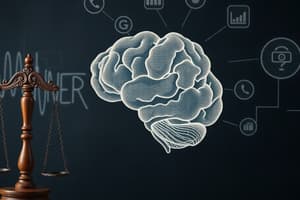Podcast
Questions and Answers
What is a heuristic?
What is a heuristic?
- A practical method for problem solving (correct)
- An assessment of past events
- A way to evaluate emotions
- A mathematical calculation
What is a frequency estimate?
What is a frequency estimate?
An assessment of how often various events have occurred in the past.
What does attribute substitution refer to?
What does attribute substitution refer to?
A strategy of relying on easily accessed information as a substitute for needed information.
Provide an example of attribute substitution.
Provide an example of attribute substitution.
What is the availability heuristic?
What is the availability heuristic?
Give an example of an availability heuristic.
Give an example of an availability heuristic.
What is the representativeness heuristic?
What is the representativeness heuristic?
What happens in using the representativeness heuristic?
What happens in using the representativeness heuristic?
What is the 'Man Who Argument'?
What is the 'Man Who Argument'?
Why is covariation important?
Why is covariation important?
What are illusions of covariation?
What are illusions of covariation?
What causes illusions of covariation?
What causes illusions of covariation?
What is motivated reasoning?
What is motivated reasoning?
What is confirmation bias?
What is confirmation bias?
When judging covariation, what is likely to guide the process?
When judging covariation, what is likely to guide the process?
Provide an example of confirmation bias.
Provide an example of confirmation bias.
What is base-rate information?
What is base-rate information?
Provide an example of base rate information.
Provide an example of base rate information.
What produces the neglect of base rates?
What produces the neglect of base rates?
When are people likely to respond to base rate information?
When are people likely to respond to base rate information?
When does Type 2 thinking come into play?
When does Type 2 thinking come into play?
What is Type 1 thinking?
What is Type 1 thinking?
What is Type 2 thinking?
What is Type 2 thinking?
What principle does the availability heuristic operate on?
What principle does the availability heuristic operate on?
Under what conditions are heuristic-based judgments more likely?
Under what conditions are heuristic-based judgments more likely?
What helps sophisticated Type 1 thinking occur?
What helps sophisticated Type 1 thinking occur?
When is base rate neglect more likely to happen?
When is base rate neglect more likely to happen?
How are people more alert to a base rate?
How are people more alert to a base rate?
What happens when both sophisticated Type 1 and Type 2 judgments are triggered?
What happens when both sophisticated Type 1 and Type 2 judgments are triggered?
What basic statistical concepts do people understand?
What basic statistical concepts do people understand?
What must be changed to improve the quality of someone's thinking?
What must be changed to improve the quality of someone's thinking?
What is induction?
What is induction?
Give an example of induction.
Give an example of induction.
What is deduction?
What is deduction?
What does deduction help maintain?
What does deduction help maintain?
What type of evidence is most valuable?
What type of evidence is most valuable?
What happens when people encounter confirming evidence?
What happens when people encounter confirming evidence?
Why is confirmation bias beneficial?
Why is confirmation bias beneficial?
Provide an example of confirmation bias.
Provide an example of confirmation bias.
What is belief perseverance?
What is belief perseverance?
Why is searching memory to confirm a hypothesis unreliable?
Why is searching memory to confirm a hypothesis unreliable?
What is a categorical syllogism?
What is a categorical syllogism?
Give an example of a categorical syllogism.
Give an example of a categorical syllogism.
What is a valid syllogism?
What is a valid syllogism?
What is an invalid syllogism?
What is an invalid syllogism?
Provide an example of a valid syllogism.
Provide an example of a valid syllogism.
Provide an example of an invalid syllogism.
Provide an example of an invalid syllogism.
What is belief bias?
What is belief bias?
Errors in logical reasoning are also quite _____ and so don't look like mere carelessness.
Errors in logical reasoning are also quite _____ and so don't look like mere carelessness.
What does it mean when people show the belief-bias pattern?
What does it mean when people show the belief-bias pattern?
What is an example of affirming the consequent?
What is an example of affirming the consequent?
What is an example of denying the antecedent?
What is an example of denying the antecedent?
What is a conditional statement?
What is a conditional statement?
How is reasoning about conditional statements perceived?
How is reasoning about conditional statements perceived?
What does the Selection Task indicate?
What does the Selection Task indicate?
We make decisions some _____ and some ____.
We make decisions some _____ and some ____.
What is utility maximization?
What is utility maximization?
You will make decisions that will give you as much _____ as possible.
You will make decisions that will give you as much _____ as possible.
What can happen if a participant receives both positive and negative frames?
What can happen if a participant receives both positive and negative frames?
How must you manipulate someone's evaluation of something?
How must you manipulate someone's evaluation of something?
What happens if the frame emphasizes losses?
What happens if the frame emphasizes losses?
What is risk seeking?
What is risk seeking?
What triggers risk seeking behavior?
What triggers risk seeking behavior?
What happens if the choice is framed in terms of gains?
What happens if the choice is framed in terms of gains?
What is risk aversion?
What is risk aversion?
An emphasis on reasons suggests that decision making is a _____ and _____ exercise.
An emphasis on reasons suggests that decision making is a _____ and _____ exercise.
What is reason-based choice?
What is reason-based choice?
What are somatic markers?
What are somatic markers?
What role does the orbitofrontal cortex play?
What role does the orbitofrontal cortex play?
What happens to participants with orbitofrontal cortex damage?
What happens to participants with orbitofrontal cortex damage?
When evaluating risks, people rely on?
When evaluating risks, people rely on?
What is affective forecasting?
What is affective forecasting?
Why do people overestimate 'regret avoidance'?
Why do people overestimate 'regret avoidance'?
What can people usually predict about their reactions?
What can people usually predict about their reactions?
Why do people overestimate how long valence feelings will last?
Why do people overestimate how long valence feelings will last?
What is the paradox of choice?
What is the paradox of choice?
What tendency do people have when jumping to conclusions?
What tendency do people have when jumping to conclusions?
What happens when people see a non-random sequence of outcomes?
What happens when people see a non-random sequence of outcomes?
What is the hot hand fallacy?
What is the hot hand fallacy?
What explains the hot hand fallacy?
What explains the hot hand fallacy?
What is the gambler fallacy?
What is the gambler fallacy?
Provide an example of the gambler fallacy.
Provide an example of the gambler fallacy.
Why do people conclude there are more words with 'K' in the first position?
Why do people conclude there are more words with 'K' in the first position?
In terms of pain, what do people tend to neglect?
In terms of pain, what do people tend to neglect?
What does prospect theory assume?
What does prospect theory assume?
What explains how loss aversion affects decision-making?
What explains how loss aversion affects decision-making?
How does classical utility theory differ from prospect theory?
How does classical utility theory differ from prospect theory?
What distinguishes prospect theory from utility theory?
What distinguishes prospect theory from utility theory?
What is loss aversion?
What is loss aversion?
Study Notes
Heuristics and Judgement
- Heuristics are practical methods for problem-solving and learning that simplify decision-making.
- The availability heuristic relies on immediate examples to judge frequency, impacting judgments on events like shark attacks.
- Representativeness heuristics involve making probabilistic judgments based on how closely an instance resembles a known prototype.
Cognitive Biases
- Attribute substitution occurs when individuals use easily memorable information as a proxy for more complex information.
- Confirmation bias leads individuals to favor evidence that supports their beliefs while dismissing contradictory evidence.
- Belief perseverance occurs when individuals ignore disconfirming evidence that contradicts their established beliefs.
Evidence Evaluation
- Illusions of covariation occur when individuals perceive a relationship between two variables where none exists, often due to selective evidence consideration.
- Motivated reasoning reflects biased evaluation of evidence to align with personal views and prior assumptions.
Decision Making Processes
- Type 1 thinking is fast, intuitive, and emotional, while Type 2 thinking is deliberate, involving deeper analysis and reasoning.
- Base-rate neglect is common, where individuals disregard general probabilities in favor of specific information unless it's the sole data available.
Logical Reasoning
- Deduction involves deriving conclusions based on premises, maintaining beliefs that reflect reality; induction forecasts new cases based on observed data.
- Categorical syllogism is a logical argument format based on premises about categories, with validity determined by whether conclusions logically follow.
Emotional Influence
- Somatic markers involve bodily feelings tied to emotions that assist in decision-making, especially under uncertainty or risk.
- Affective forecasting concerns predicting one's emotional responses to future events, often inaccurately estimating the intensity and duration of those reactions.
Risk Perception
- Prospect theory explains that individuals weigh potential losses more heavily than equivalent gains, demonstrating loss aversion.
- Risk-seeking behavior typically arises when choices are framed in terms of losses, whereas framing in terms of gains leads to risk aversion.
Statistical Misconceptions
- Decisions are sometimes based on small sample sizes, leading to the hot hand phenomenon, which misinterprets random success as increased future performance.
- The gambler’s fallacy mistakenly assumes that previous outcomes affect future probabilities, showing misconceptions in understanding chance.
Utility and Value
- Utility maximization refers to making decisions that provide the highest perceived value or satisfaction.
- Classical utility theory and prospect theory differ fundamentally in how decisions are weighted and the perceived value of risk and reward.
Studying That Suits You
Use AI to generate personalized quizzes and flashcards to suit your learning preferences.
Description
Explore key concepts in judgement and reasoning with this set of flashcards. From heuristics to attribute substitution, test your understanding of essential terms used in psychological decision-making processes. Perfect for students looking to enhance their grasp of cognitive psychology.




